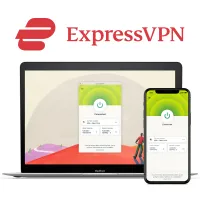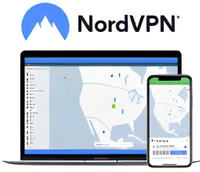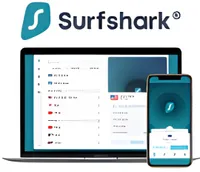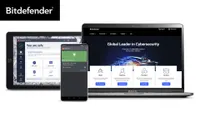How to protect your new devices (and yourself)
How to properly secure your new devices from online threats

Sign up for breaking news, reviews, opinion, top tech deals, and more.
You are now subscribed
Your newsletter sign-up was successful
1. Top 3 best VPNs
2. How to choose a VPN
3. How we test VPNs
4. VPN FAQs
5. Top 3 best antivirus
6. How to choose antivirus software
7. How we test antivirus
8. Antivirus FAQs
9. Top 3 best password managers
10. How to choose a password manager
11. How we test password managers
12. Password manager FAQs
A tech device in today's digital age is as risk-prone as it is indispensable. Cyberattacks are on the rise and there are hundreds of thousands of bad actors on the web trying to track your online activities and infect your device with malicious software, with the aim of stealing your data.
So, how do you protect your device and yourself from these intruders? Make use of the best VPN, the best antivirus, and the best password manager. While this may seem daunting, many solutions which bundle all three exist.
However, the market is flooded with providers, all of whom claim to be the best. This is where our TechRadar experts, who review and test security tech on a daily basis, come into the picture. Read on to find which VPNs, antiviruses, and password managers are worth a look.
The best VPN apps in 2026
A VPN both can hide your real location from malicious actors trying to steal your data as well as giving you access to streaming services and other content that's restricted in your region. This allows you to navigate the internet on your new device freely.
While all of the providers on our list of the best VPN services are fantastic options, here are the top three:
1. ExpressVPN: the best VPN service in 2023
ExpressVPN is the best VPN service in the industry right now, thanks to its easy-to-use apps across various device types, blazing speeds, top-notch security features, and possibly the widest network of server locations I’ve ever seen.
It also leads the way in customer support, offering friendly 24/7 support via phone, live chat, and email – and an exhaustive knowledge hub is just the perfect cherry on top. In addition to a standard 30-day money-back guarantee for risk-free testing, TechRadar readers can avail of a special offer entailing 3 months of extra protection for free on its 12-month plan.
2. NordVPN: the fastest VPN around
NordVPN is your best bet if you want a comprehensive security package at a reasonable price. Besides nailing the basics, it offers tons of extra cybersecurity tools, including a built-in antivirus, password manager, and ad and malware blockers.
It also knocks it out of the park when it comes to unblocking Netflix and other streaming services, thanks to its long list of servers, superior unblocking capabilities, and class-leading speeds. Be sure to make the most of its 30-day money-back guarantee and see how it compares to ExpressVPN.
3. Surfshark: the best cheap VPN
It's hard to beat Surfshark's value for money, especially when you consider the power under its hood. It's not only the fastest provider in our testing, but it also comes with unlimited simultaneous connections, making it ideal for those who want to protect all of the devices of their friends and family on a single plan.
It unblocks just about everything that's thrown at it, and with easy-to-use interfaces on all of its clients, it’s one of our top recommendations for those new to VPNs. There’s also a 30-day money-back guarantee so that you can try it out without putting any money on the line.
How to pick a VPN to secure your device
The range of security features that come with a VPN should be your first consideration when looking for one. For example, does it support secure protocols like WireGuard, OpenVPN, and IKEv2? If it does, you’ll be able to use the VPN on most of your devices without any provider restrictions. Other security offerings, including a no-logging policy, AES-256 encryption, and a kill switch, are all important kegs in the safety wheel of a VPN.
If your memo includes streaming, look for a VPN with powerful unblocking capabilities and a massive number of servers and server locations. A high-speed VPN is just as important for buffer-free streaming, yes, but speed becomes all the more important if you want a VPN for gaming.
Also, consider the cost of the provider. Does it offer the desired level of protection at your budget? The features you’re looking for are also important when deciding the value-to-price aspect. For example, are you willing to pay a little extra for dark web monitoring, a bundled password manager, or identity theft protection?
The number of simultaneous connections may make or break the deal for you, especially if you want a VPN for your family. While most providers come with 6-10 multiple logins, Surfshark and Private Internet Access offer unlimited simultaneous connections.
If you're new to VPNs, you'd also want a VPN that's easy to use and comes with lots of reliable support options, including an in-depth knowledge hub for help on the fly.
How we test VPNs
We follow our VPN testing methodology and begin our investigation at the provider’s website, where we comb through its privacy policies and any claims it makes. We then try to gauge how transparent and honest its data collection and handling policies are and look for any tracking cookies on the website and whether they become active during our visit.
To check the provider’s performance, we test its speed at least 120 times across two different locations, one a US home connection and the other a 1 Gbps UK data center.
We also test the kill switch’s effectiveness (plus all of the other features on offer) on the most popular clients – Windows, Mac, iOS, Android, and Linux. This is also where we look for any IP or data leaks, and while we’re fiddling with the apps, we also pay close attention to their design and ease of use.
Next, we throw multiple big-name streaming services at the provider to check its unblocking capabilities. We repeat the test from three different locations around the world for accurate results.
Lastly, to make sure that our results are, at all times, relevant and that our recommendations always include the top performers, our in-house experts review the top 30 VPNs every 6 months and tweak our VPN reviews accordingly.
Using a VPN FAQs
Are VPNs safe?
To ascertain whether a VPN service is trustworthy, ensure that it has a strict no-logs policy in place, meaning it isn't tracking your IP or internet usage. Next, it should support the most secure protocols (WireGuard, OpenVPN, and IKEv2) and offer industry-standard AES-256 encryption. Last but not least, indispensable security features like a kill switch and leak protection should all be in place and working smoothly, too.
All of the providers on our best VPN services page are extremely safe. They mask your real location so that your internet activities cannot be traced back to you, providing you with a cloak of invisibility while you're out and about on the internet.
Is it legal to use a VPN?
In most countries, using a VPN is legal as long as you're using it for legitimate purposes. However, if you use a VPN for illegal activities, such as downloading copyrighted material, it’s a crime regardless of where you are and authorities can slap you with fines and even imprisonment.
There are also countries like North Korea, China, Russia, Turkey, UAE, and Oman that have either banned the use of all VPNs or heavily regulated how VPN companies operate within their borders, including allowing the use of only select government-approved providers.
The best antivirus in 2026
The internet is filled with threats to your digital security, and the best way to ward off all of them, including malware, ransomware, and viruses, is to install one of the best antiviruses as soon as you get your hands on your new device.
Out of the hundreds of antivirus solutions, here are the three that are worth your time and money:
1. Bitdefender: the best antivirus software right now
Bitdefender is one of the very best when it comes to stopping both new and unknown malware, and it does so very quickly – faster than most antiviruses I've tried. There are also tons of add-ons on offer, including an app lock, a Wi-Fi scanner, and real-time data breach alerts.
What's even better is that it takes up very little system resources and it’s just about the perfect choice for those new to antiviruses – and there's a 30-day money-back guarantee so that you can try the service risk-free before you commit.
Visit the US site
Visit the UK site
Visit the Australia site
2. Norton: the best antivirus for malware and identity protection
Norton leads the way in identity theft protection, thanks to its LifeLock feature that scans the dark web and stolen data banks for your personal details. Not only that, but it's also our top recommendation for all-in-one security – you're getting a password manager, an unlimited VPN, online storage, and even parental controls.
Its class-leading 60-day money-back guarantee makes it every bit worth a trial, and you'll also get a Virus Protection Promise should you sign up for its auto-renewal program.
Visit the US site
Visit the UK site
Visit the Australia site
3. Avast One: the best antivirus software for gamers
Avast One is a must-have for gamers, all thanks to its gaming mode that's enabled by default when you boot up a game. It will protect you from frustrating popups, ads, and reminders that may hinder your gaming experience.
While the free version comes with all of the basics, the premium plan oozes value, as it comes with extra perks like a VPN, a system scanner, webcam monitoring, a password manager, and more.
Visit the US site
Visit the UK site
Visit the Australia site
How to pick an antivirus to secure your device
The first thing you’d want to consider while looking for an antivirus solution is the antivirus engine—the key component of any antivirus software that’s used to scan your devices. The better the antivirus engine, the better the malware-detection rate and the overall level of protection that you'll enjoy.
Now, how do you check an antivirus engine’s quality? Well, you can certainly rely on our detailed antivirus reviews to give you the best advice. However, if you want to be extra certain, you can check out the ratings given by independent labs, such as AV-TEST and AV-Comparatives, that test antiviruses day in and day out. It's worth noting that we, too, leverage their test results and analyses to make sure that our reviews are comprehensive and accurate.
Next, you need to consider the level of security you desire for your device(s). An entry-level plan – or even free antivirus products like Bitdefender or Windows Defender – can be more than enough if all you’re looking for is basic protection.
However, if you want foolproof protection against all kinds of online threats, opt for a fully-fledged internet security suite that offers tons of extra security features such as dark web monitoring, parental controls, and cross-platform and multi-device support covering all of your devices, including Windows, Mac, iOS, Android, and Linux.
It may also be a wise and frugal decision to opt for bundled solutions with a VPN and a password manager. If you’re looking to get the trio anyway – as you should – why not avail of good discounts by buying them together?
Are you a techie? If so, you'll enjoy the endless options that customizable antivirus software brings to the table. However, if you're a beginner, opt for easy-to-use apps with a simple design and interface.
How we test antivirus software
The primary task of antivirus software is to keep malware and other threats at bay. To test a program’s malware-detection and removal capabilities, we subject it to both known and unknown malware files.
‘Unknown’ malware files refer to our experts’ hand-crafted malware that the antivirus program would have never encountered before. This helps us find out whether an antivirus solution is actually as good as it says and whether it'll be able to keep up with attackers on the internet who manufacture new threats daily.
Next, we test the impact of an antivirus on local device resources and its day-to-day operations. After all, protection at the cost of a slow device isn't going to cut it.
For this, we install the antivirus on multiple devices and distros and then launch several browser tabs at once, attach files to emails, and run multiple apps simultaneously to see how much of the system resources the antivirus is consuming.
As I mentioned earlier, we also leverage a couple of reputable independent testing platforms that test all of the popular antiviruses at regular intervals by throwing hundreds, if not thousands, of threats at them.
In addition to testing all of the extras on offer, like password managers, VPN add-ons, and parental controls, we also evaluate each program's support options. This includes measuring the response time of the agents, the accuracy of their replies, and the viability of a company's online library of resources.
Using antivirus FAQs
What does antivirus do?
The primary task of an antivirus is to keep your device safe from malware, viruses, ransomware, and other types of threats. It does so by first scanning your device for any existing malware threats. Second, it scans files in real time as they are being introduced into your system to prevent malware from entering your device in the first place.
Apart from this, antivirus programs also use heuristic detection (finding close matches) and behavioral analysis to detect system threats well before they can be a hazard to your system's health. Once it identifies a threat, it immediately quarantines it to keep it out of the reach of other files and programs on your device.
For more details on this topic, see our full breakdown of exactly how antivirus software works.
Do I really need antivirus in 2023?
Yes. Cybercrime is a growing nuisance, and threats are becoming more sophisticated with the advent of AI and other technology. Malware actors have only gotten smarter and are finding new ways to get into your system. All of this makes an antivirus almost indispensable.
Apart from protecting you against both known and unknown malware files and phishing attacks, good antivirus software can also keep your identity and personal details from leaking into the dark web or the internet at large. Not only that, but any phishing attack attempts by hackers to trick you into giving your passwords and sensitive credentials can also be successfully thwarted with the help of a reliable antivirus.
The best password manager in 2026
The best password managers not only protect your passwords and passkeys – and even your credit card information and other personal details – from falling into the wrong hands, but they also offer a lot of extra cybersecurity tools, including parental controls, identity theft protection, and anti-phishing measures, for all-round protection.
After hours of intensive comparing password managers, here are our top three recommendations:
1. NordPass: the best password manager right now
NordPass is an easy-to-use password manager ideal for just about everybody, including individuals, families, and businesses. It allows you to save unlimited passwords across multiple devices, including Windows, Mac, iOS, Android, Linux, or even popular browsers, for that matter.
There's also a stripped-down free tier you can try on for size, but the premium plan is, of course, more value-packed – and it comes with a 30-day refund window in case you change your mind.
2. Dashlane: the most secure password manager
Dashlane isn't just one of the most popular password managers, but it's also the most secure, thanks to real-time phishing alerts and a bulk password changer that can reset all of your passwords at once
Its premium plan offers cast-iron protection with add-ons, including dark web monitoring, secure document storage, a bundled VPN, and multi-factor authentication. Put it to the test and see why it’s a close second to NordPass.
3. Bitwarden: the best free password manager
Bitwarden offers an excellent free plan that gives most paid password manager plans a run for their money. You will get features like multi-device synchronization, optional self-hosting, and unlimited password storage without paying a single penny.
It’s open source, so security is top-notch, and you can also consider upgrading to its premium plan if you want to enjoy business-focused features such as password sharing and controlled access across various user groups.
How to choose a password manager to secure your device
A password manager’s security should be the first thing you look into. Check where the platform stores your passwords – on the cloud or locally on the device. Both these methods are generally secure, but they have their own advantages and disadvantages, so consider what you are more comfortable with.
Also, look for the extent of additional security the password manager offers. Does it have two-factor authentication or biometric-based logins? How about add-ons like parental controls, dark web monitoring, or a VPN? You may also prioritize a password manager that can analyze weak passwords and suggest strong ones in their place.
Privacy is as crucial as a factor can get, so look for a password manager that doesn’t share your personal information with unauthorized third parties.
Next on the list is compatibility. You must be using various devices, including a smartphone and/or tablet (which can be an iOS or Android device), a computer and/or laptop (Windows vs Mac), or any combination of them. Make sure the password manager you choose is compatible with all of the devices you use.
It’s worth noting that if you’re looking for synchronization across all of your devices, you may have to pay a little extra, as most password managers reserve this feature for their premium plans.
This is also where value-for-money comes into the picture – the key here is to select a plan that strikes a balance between your budget and the features you want. If you have virtually nothing to spare, check out our list of the best free password managers.
Lastly, consider the manager’s ease of use as well. If you’re already using a password manager, your new platform should be able to help you migrate quickly and without any hassle. Also, all of the most viable options in the provider’s apps and browser extensions should be easy to find and simple to understand.
How we test password managers
We periodically put more than 30 password managers under the scanner and rate them on the potency of their features, usability, performance, and value for money.
We try each of them out on all of the platforms it's available on, including Windows, Mac, Android, iOS, and Linux – as well as browsers like Chrome, Safari, and Edge. All of this hard work is to ensure that we recommend only the cream of the crop, as we realize how moving around your personal data from platform to platform is neither feasible nor advisable.
We ensure that our recommendations use strong industry-standard encryption methods (AES 256-bit or the cutting-edge XChaCha20), and we also look at and try out the additional features on offer, such as auto-fill, multi-factor authentication, cross-platform synchronization, and other bundled products.
Customer support is a crucial component of any password manager, and to test it out, we throw all sorts of curveballs at the support agents and then carefully assess the accuracy and speed of their replies.
For more info on our testing procedures, check out our how we test page for TechRadar.
Password managers FAQs
What is the difference between free and paid password managers?
Both free and paid password managers offer the same level of protection, but paid solutions come with more advanced features such as dark web monitoring, cross-platform synchronization, and increased storage. And more often than not, they also come with a bundled VPN, antivirus protection, and parental controls.
How does a password manager work?
Password managers work on strong encryption models and zero-knowledge architecture. All of your passwords are encrypted using methods like AES (Advanced Encryption Standards), which can only be accessed with a master password that only the owner has.
Zero-knowledge essentially means that passwords are encrypted before they’re actually stored on the cloud, meaning that not even the password manager company has access to your sensitive passwords—so they have 'zero knowledge' about your passwords.
We test and review VPN services in the context of legal recreational uses. For example: 1. Accessing a service from another country (subject to the terms and conditions of that service). 2. Protecting your online security and strengthening your online privacy when abroad. We do not support or condone the illegal or malicious use of VPN services. Consuming pirated content that is paid-for is neither endorsed nor approved by Future Publishing.
Sign up to the TechRadar Pro newsletter to get all the top news, opinion, features and guidance your business needs to succeed!

Olivia joined Tom's Guide in October 2023 as part of the core Future Tech Software team, and is the Commissioning Editor at Tom's Guide. With a background in cybersecurity, Olivia is interested in how VPNs protect users' privacy, and how they improve online safety. She also regularly uses VPNs to make sure they deliver what they promise, and specializes in testing VPNs with streaming sites.








